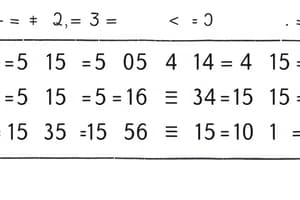Podcast
Questions and Answers
Which of the following is a prime number?
Which of the following is a prime number?
- 8
- 9
- 11 (correct)
- 4
Which statement accurately describes a composite number?
Which statement accurately describes a composite number?
- It is always an even number.
- It has exactly two factors.
- It cannot be broken down into prime factors.
- It has more than two factors. (correct)
What is the result of the following operation: $6 + 3 \times 2$?
What is the result of the following operation: $6 + 3 \times 2$?
- 15
- 12
- 9 (correct)
- 18
Which of these numbers has exactly two factors?
Which of these numbers has exactly two factors?
What is the prime factorization of the number 12?
What is the prime factorization of the number 12?
Which of the following statements about factors is true?
Which of the following statements about factors is true?
Which of the following is an example of a multiple of 5?
Which of the following is an example of a multiple of 5?
The Sieve of Eratosthenes is used to find which of the following?
The Sieve of Eratosthenes is used to find which of the following?
Flashcards
Factor
Factor
A number that divides evenly into another number, leaving no remainder.
Multiple
Multiple
The product of a number and another whole number.
Prime Number
Prime Number
A whole number greater than 1 with only two factors: 1 and itself.
Composite Number
Composite Number
Signup and view all the flashcards
Prime Factorization
Prime Factorization
Signup and view all the flashcards
Addition
Addition
Signup and view all the flashcards
Multiplication
Multiplication
Signup and view all the flashcards
Order of Operations
Order of Operations
Signup and view all the flashcards
Study Notes
Factors and Multiples
- A factor of a number is a number that divides evenly into that number, leaving no remainder.
- A multiple of a number is the product of that number and another whole number.
- Every number has at least two factors: 1 and itself.
- Prime numbers have exactly two factors: 1 and the number itself.
- Prime factorization breaks down a composite number into its prime factors.
Arithmetic Operations
- Addition: Combining two or more numbers to find their sum.
- Subtraction: Finding the difference between two numbers.
- Multiplication: Repeated addition of a number.
- Division: Finding how many times one number is contained within another.
- Order of operations (PEMDAS/BODMAS): Parentheses/Brackets, Exponents/Orders, Multiplication/Division (left to right), Addition/Subtraction (left to right). Following this order is crucial for accurate calculations.
Composite Numbers
- A composite number is a whole number that has more than two factors.
- Composite numbers can be broken down into prime factors.
- Examples of composite numbers include: 4, 6, 8, 9, 10, 12, and so on.
Prime Numbers
- A prime number is a whole number greater than 1 that has only two factors: 1 and itself.
- Examples of prime numbers include: 2, 3, 5, 7, 11, 13, and so on.
- The number 1 is neither prime nor composite.
- The first few prime numbers are crucial for understanding prime factorization and related concepts.
Relationships Between Prime and Composite Numbers
- Every whole number greater than 1 is either prime or composite.
- Prime numbers are the building blocks for all other whole numbers (except 1).
- Finding and listing prime numbers is a foundational skill. Sieve of Eratosthenes is a common tool for this purpose.
- Prime factorization is the process of finding the prime numbers that multiply to get a composite number.
- Understanding prime and composite numbers is essential for many number-related tasks including solving equations, finding greatest common factors (GCF), least common multiples (LCM), and various other mathematical problems.
Studying That Suits You
Use AI to generate personalized quizzes and flashcards to suit your learning preferences.




